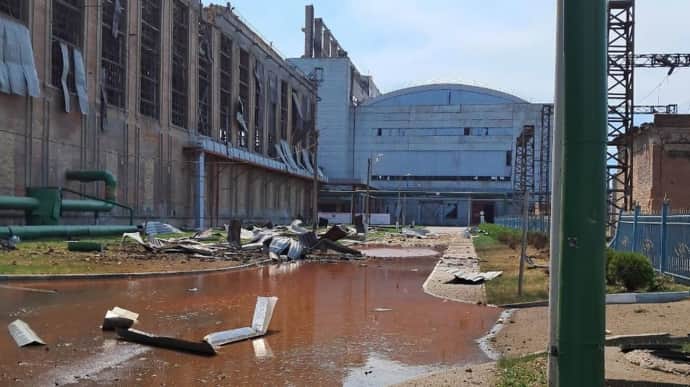Daily Flyer - May 5, 2024
A voice of Ukraine to the West

Russian glide bomb attack injures 10 in downtown Kharkiv
Russian forces struck a residential area in downtown Kharkiv on May 5, injuring at least 10 people, including some on Orthodox Easter Sunday, according to local authorities.
Kharkiv Oblast Governor Oleh Syniehubov initially reported at 2 p.m. local time that five people were injured when Russia attacked Ukraine’s second-largest city with a guided bomb. He did not specify the type of bomb used.
Russia typically employs laser-guided or satellite-guided KAB bombs, with payloads ranging from 250 to 1,500 kilograms, against Ukrainian military and civilian targets. Additionally, Soviet-era "dumb" bombs are sometimes retrofitted with low-cost gliding kits, allowing them to travel farther and with greater accuracy.
Russia has recently escalated its attacks on Kharkiv, deploying missiles, glide bombs, and kamikaze drones to damage energy infrastructure and harm civilians.
Following the reported attack, Kharkiv city mayor Ihor Terekhov stated in a Telegram post that two more people had been injured while they were inside their house.
Later, Governor Syniehubov mentioned in a separate post that medics were attending to 10 injured individuals following the Russian strikes in downtown Kharkiv, which also caused damage to houses and vehicles.
On May 5, as Ukraine observed Orthodox Easter, Russia launched Shahed kamikaze drones, wounding six more people in a drone attack on Kharkiv. Debris from downed drones in the city's Osnovianskyi district reportedly caused fires that engulfed eight private homes in the area.
Despite the barrage, Ukrainian air defense successfully intercepted 23 of the 24 Shahed-type drones launched by Russia overnight, according to the Ukrainian Air Force. The intensified Russian attacks underscore the ongoing threat to Kharkiv and the importance of effective air defense in protecting civilian lives and infrastructure.
Russia lures Cubans to the army with offers of high pay and a Russian passport
Leaked documents reveal that Russia has been coercing Cuban citizens into joining the Russian Armed Forces, offering salaries of around $2,000 per month and promising Russian passports within months of enlistment, according to a BBC investigation published on May 4.
Since the full-scale invasion of Ukraine in February 2022, hundreds of Cubans have allegedly joined Russia's Armed Forces, as indicated by online leaks. At least 200 Cuban names were exposed in September and October 2023 by pro-Ukrainian hackers, with the BBC confirming at least 31 accounts linked to Russia or the Russian army.
The BBC's investigation revealed social media posts suggesting that some Cubans received Russian passports within a few months of signing up, a claim supported by local media reports indicating that newly recruited Cuban fighters would be granted citizenship "in the future."
Additionally, other Cubans who moved to Russia seeking work in the construction industry were reportedly sent instead to Ukraine's eastern front. In September 2023, Cuba discovered a human trafficking ring aimed at recruiting Cubans to fight for Russia, an act that Cuba's Foreign Affairs Ministry "firmly rejects."
Russia has intensified its campaign to recruit foreigners from neighboring countries and exploited migrant workers for its war against Ukraine to avoid domestic mobilization. Foreign recruits from Nepal, Cuba, Uzbekistan, Armenia, Kazakhstan, Somalia, and other Central Asian and African countries have become primary targets for Russian recruitment efforts.
In January 2023, Russian President Vladimir Putin signed a decree allowing foreign nationals who join the Russian Armed Forces to apply for Russian citizenship, further incentivizing international recruitment.
These revelations highlight Russia's attempts to bolster its military ranks without relying solely on domestic conscription, exposing a wider pattern of coercion and exploitation of foreign nationals in its ongoing war against Ukraine.
Cuba and Russia are two allies since the start of the Cold War, have reciprocal visa-free travel between the countries, as well as direct flights between Havana and Moscow.
Russians launch 5 missiles at Sloviansk Thermal Power Plant

Russian forces fired five missiles at the Sloviansk Thermal Power Plant (TPP) in Donetsk Oblast, according to Volodymyr Proskunin, the deputy head of the Mykolaiv City Military Administration, who commented to Suspilne.
"Today, on 5 May, at 10:35, an attack on Donbasenergo's Sloviansk TPP began. The attack damaged a number of facilities on the territory of the plant," Proskunin said. He reported that the Russian military used Smerch multiple launch rocket systems (MLRS) to fire four cluster munitions and one high-explosive missile.
Fortunately, there were no casualties as a result of the attack, but the damage to the power plant is part of a broader Russian strategy to target Ukraine's critical infrastructure, causing disruption and potentially affecting energy supplies. The use of cluster munitions and high-explosive missiles against civilian infrastructure is a grave concern, highlighting the ongoing risks to Ukraine's industrial and energy sectors amid Russia's continued aggression.

